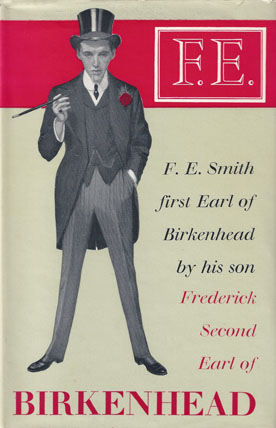We are now closed for the Christmas and New Year period, returning on Monday 5th January 2026. Orders placed during this time will be processed upon our return on 5th January.

Out of Print
Twenty-five years ago, soon after the death of his father, the present Earl of Birkenhead wrote a memoir which was widely reviewed and soon went out of print. It had the freshness and immediacy to be expected of a young man's first book, in every respect very close to the subject.
The present book appears at a time which permits more candid treatment than was possible in 1933 and, what is far more important, a great deal of fresh material which was not available for the first book is now included; a number of hitherto unpublished letters, one from Lloyd George on the appointment of the Lord Chief Justice, and a number from the Royal Archives at Windsor Castle which show King George V's honest consternation at the prospect of having F. E. Smith as his Lord Chancellor, and reveal in amusing fashion the difference of opinion between the strict monarch and the unconventional servant on the subject of clothing at Cabinet Meetings, which the writer has called "The Battle of the Silk Hat."
In addition to such letters, the great number of memoirs, diaries and letters, many of them written by his colleagues in the Cabinet or in Parliament, which have appeared in the twenty-nine years since F.E.'s death, fill in the background of his life and provide confirmation of judgments in a way which was not possible earlier. From the moment that the young member for the Walton Division of Liverpool was returned in 1906, he dominated the House.
The striking appearance, the biting wit, the phenomenal brain, the flamboyant personality which had already brought him into prominence at Oxford, made F.E. a storm-centre throughout his public life. As an advocate, he figured in some of the most sensational cases of the century; the Marconi libel suit, the Sackville will suit, and, of course, as Attorney General he prosecuted in the trial of Roger Casement, which has remained a subject of bitter controversy. This book, including all recent evidence, is the final word on the conduct of the prosecution in this trial.
The book gives full details, sometimes including verbatim records of cross-examination, which show his flashing genius in action. As Lord Chan¬cellor, F.E. was responsible for some very impor¬tant decisions; the solid as well as the spectacular side of his meteoric career is given its full due. As a politician F.E. never ceased to draw the limelight. He entered Parliament in opposition, and his political tactics were devastating. But his was no purely destructive talent: no one learned more quickly from experience, and it was this Ulster fighter, this champion of the Protestant cause, who was responsible as much as anyone for the Irish Settlement.
His personal life, his extravagance, his hard riding and hard living, his taste for brandy and cigars, his self confessed onslaught of the glittering prizes aroused angry comment, but his friends, the dearest and closest of whom was Sir Winston Churchill, remained faithful to death, and knew in their turn that his loyalty to them was absolute and unconditional.
Lord Birkenhead's biography captures the full flavour of this vibrant, challenging figure who played a leading part in politics from 1906 until his death in the early thirties, whose physical aspect is, even today, immediately recognisable by seven out of ten men in the street. He was a giant in an age of political giants : one of the finest legal minds that England has ever produced, and this book must alwavs remain the definitive biography.